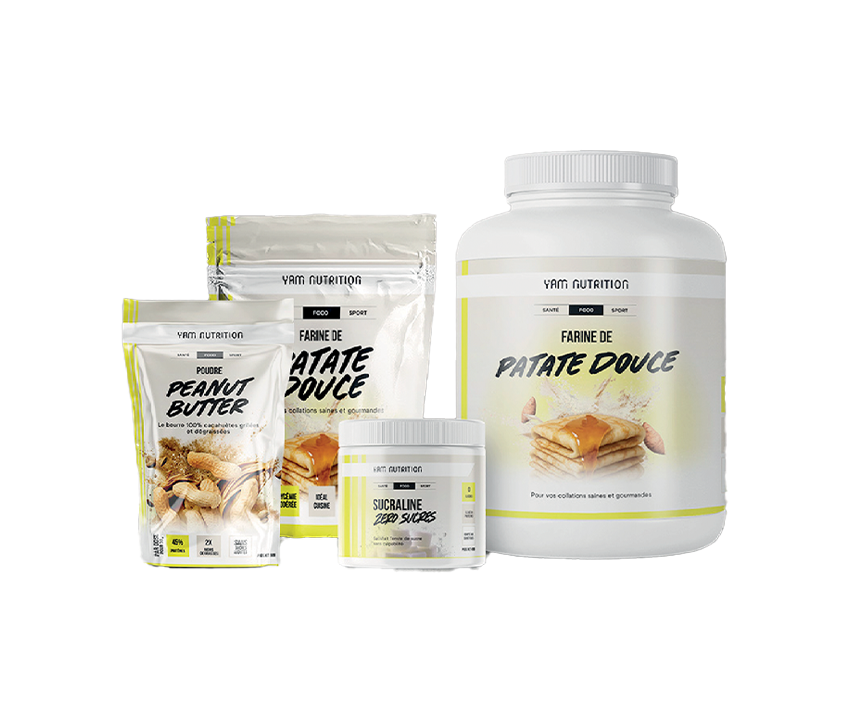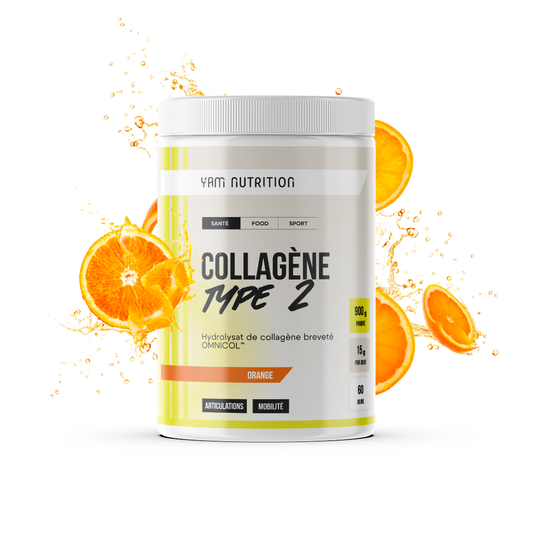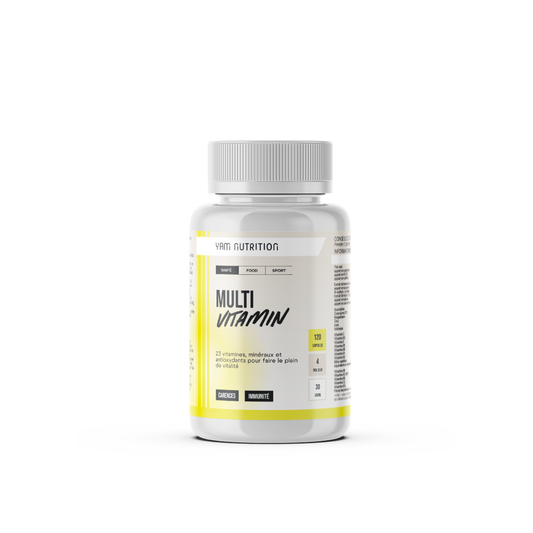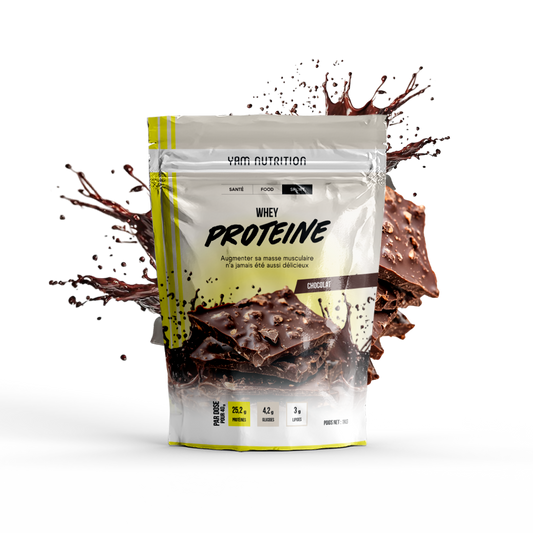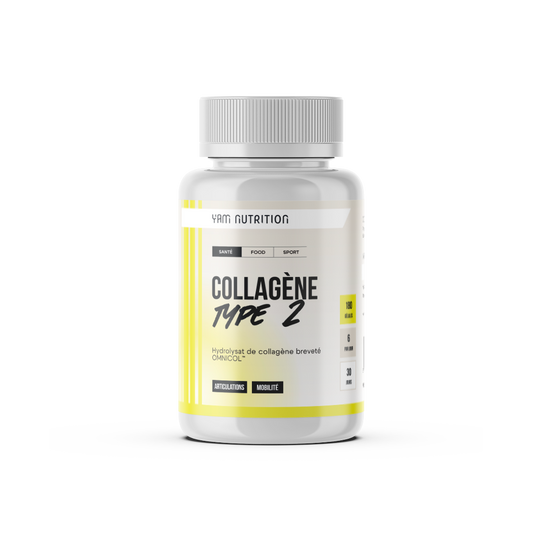In which foods is collagen found?

THE collagen Collagen is an essential protein that plays a crucial role in building connective tissue in the human body. It is abundant in skin, bones, muscles, tendons, and ligaments. This fibrous protein ensures the cohesion, elasticity, and regeneration of all these tissues. Collagen is not only vital for physical health but also plays an important aesthetic role, particularly when it comes to skin and joint health. Overall, foods contain relatively little collagen. Let's take a closer look...
OMNICOL™ Patented Collagen Hydrolysate A complex of 23 vitamins, minerals and antioxidants to boost your vitality Building muscle mass has never been so delicious
Collagen Type 2 Powder
Sale price
49,90 €
Multivitamin
Sale price
29,90 €
Whey Protein
Sale price
From 37,90 €
What is collagen?
Collagen is a structural protein that forms fibers in tissues such as skin, ligaments, cartilage, bones, and blood vessels. There are several types of collagen, each with specific functions in different tissues of the body. Type I , for example, is the most common and is found primarily in skin, tendons, bones, and organs. Because of its high tensile strength, collagen is essential for providing structure and support.
Roles and health benefits of collagen
Collagen is crucial for skin health, helping to maintain its elasticity and hydration. As we age, our natural collagen production declines, which can lead to wrinkles, dryness, and a loss of elasticity. Collagen is also essential for joint health, helping to maintain the integrity of cartilage, which is essential for preventing pain and joint diseases like osteoarthritis.
Digestively, collagen helps strengthen the intestinal wall, which can help prevent problems like leaky gut syndrome. Additionally, as a source of protein, it can support metabolism and promote satiety, aiding in weight management.
Research shows that increasing collagen intake, whether through diet or through supplements, can help improve the health of skin, joints, bones, and even hair and nails, in addition to supporting gut health and overall metabolism.
Foods that are sources of animal-based collagen
Animal sources of collagen are generally the most abundant and easily absorbed by the human body. Here are some of the main sources of animal collagen and foods to include in your diet.
Meats rich in collagen
Beef
Beef is an excellent source of collagen, especially when it comes from parts of the animal rich in connective tissue, such as the cheeks, tail, and shank. These cuts of meat are ideal for stews and long cooking times, allowing the collagen to transform into gelatin, a more easily digestible form of collagen.
Chicken
Chicken, especially parts with bone and cartilage, such as wings and legs, contains a significant amount of Collagen . Slow cooking these parts not only releases collagen but also other beneficial nutrients like chondroitin and glucosamine, which are excellent for joint health. This food is one of the best sources of collagen…
Fish and seafood
White fish, cod, codfish, halibut…
White fish, such as cod, cod, and halibut, contain collagen, particularly in their skin. Incorporating the skin into your cooking not only increases your collagen intake but also provides enhanced texture and enhanced flavor.
Crustaceans
Shellfish such as shrimp, crabs, and lobsters are rich in collagen, particularly in their outer parts like shells. Shellfish broth, made by simmering the heads and shells, is a traditional method for extracting collagen and reaping its benefits.
Foods and products rich in collagen
Broths and jellies
Broths made from animal bones and cartilage are excellent sources of collagen. These broths can be used as a base for many dishes, significantly increasing your daily collagen intake. Jellies prepared using the same method also contain high concentrations of collagen.
Skin and tendons, a dietary source of collagen…
The skin of animals like chicken and beef tendons are extremely rich in collagen . Prepared correctly, these products can transform your dishes while improving your joint and skin health.
Foods that promote collagen production
To optimize the body's natural collagen production, it's essential to consume a variety of foods rich in certain nutrients. Here are the key nutrients and foods to prioritize to boost collagen synthesis.
Vitamin C and its role
Vitamin C is a crucial cofactor in collagen synthesis, helping to bind collagen fibers together to form a strong, resilient structure. Without enough vitamin C , the body cannot efficiently produce or store collagen.
Citrus
Citrus fruits such as oranges, lemons, grapefruits, and tangerines are excellent sources of vitamin C. Incorporating these fruits into your daily diet can not only boost your immune system but also improve your body's ability to synthesize collagen.
Peppers
Bell peppers, especially red and yellow ones, are among the vegetables richest in vitamin C. They also offer other antioxidants that can help protect the collagen already present in your body.
Other essential nutrients
Zinc
THE zinc Zinc is another essential element that plays a role in collagen production. It is found in foods such as oysters, beef, pumpkin seeds, and legumes. A zinc deficiency can slow collagen production and affect wound healing. An important trace element for metabolism, zinc is also necessary for testosterone synthesis in humans.
Copper
Although required in small amounts, copper is vital for connective tissue health. Dietary sources of copper include organ meats, nuts, sunflower seeds, whole grains, and legumes.
Protein, the micronutrient found in many foods
Proteins provide the amino acids needed for collagen formation. Lean meats, eggs, dairy products, soy, and other legumes are excellent sources of complete protein, which provide all the essential amino acids for proper collagen synthesis.
Options for vegetarians and vegans
Although collagen is primarily found in animal products, there are ways for vegetarians and vegans to promote collagen production in their bodies by consuming foods rich in the nutrients needed for its synthesis.
Plant-based collagen boosters
Leafy green vegetables
Green vegetables such as spinach, kale, and Swiss chard are rich in vitamin C and also contain antioxidants that protect collagen fibers in the body. The presence of chlorophyll in these vegetables may also play a role in collagen production.
Nuts and seeds, foods that indirectly contribute to protein synthesis
Nuts, such as almonds, and seeds, such as chia and pumpkin seeds, are good sources of zinc and copper, which aid in collagen synthesis. Incorporating these foods into your daily diet can contribute to healthy collagen production.
Plant-based food supplements
For those who struggle to get enough collagen-boosting nutrients through diet alone, dietary supplements can be a helpful option. Look for supplements containing vitamin C, zinc, and natural silicon, often derived from plant sources and suitable for vegetarian and vegan diets.
Collagen Supplements: An Essential Solution for Health and Beauty
Collagen, the protein vital for maintaining the integrity of our skin, bones, and joints, begins to decline in our bodies as early as our mid-twenties. To counteract the effects of this natural decline, food supplements Collagen supplements offer an effective and convenient solution. By providing exogenous collagen, these supplements help compensate for decreased internal production, offering visible benefits such as improved skin elasticity and hydration, reduced joint pain, and stronger hair and nails. Easy to incorporate into your daily regimen, collagen supplements are available in several forms, including soluble powders, capsules, and gels, to suit different lifestyles and dietary preferences. Whether it's to revitalize the appearance of skin, support joint health, or promote tissue healing, adding collagen supplements to your routine can be a step toward better overall health.
Collagen, an ally for your bone, muscle and joint health
Although collagen can be obtained through diet from animal sources such as beef, chicken, fish, or shellfish, it can sometimes be difficult to consume enough of these foods to compensate for the natural decline in its production with age. This is why collagen supplements are a convenient and effective solution to support health of the skin , joints and overall metabolism. Products and food supplements developed by YAM Nutrition, such as Marine Collagen, Collagen Type 1 and Collagen Type 2 , offer high-quality formulas enriched with essential nutrients to optimize collagen synthesis and meet the specific needs of each individual. Whether you are athletic, sedentary, or simply concerned about maintaining your well-being, incorporating these supplements into your routine can help you regain joint comfort and more radiant skin, while contributing to the protection of your connective tissues.
